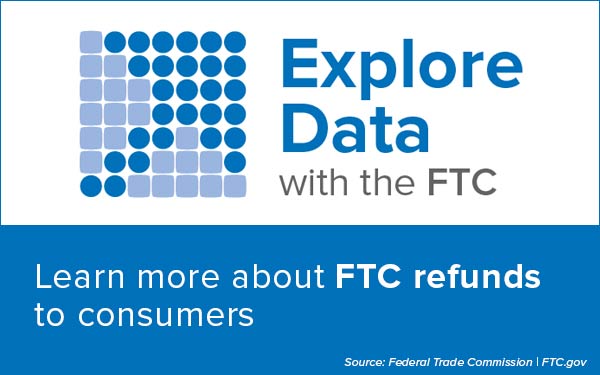New data released by the Federal Trade Commission shows that FTC actions led to more than $482 million in refunds to consumers across the country in 2020.
A core part of the FTC’s mission is to return money to consumers who have been harmed by fraud or other illegal business practices. More than 50 different FTC cases resulted in distributions to consumers in 2020.
The FTC Act allows the FTC to seek refunds from companies whose actions harm consumers.
During 2020, more than 1.6 million consumers received refunds from the FTC as a result of law enforcement cases. The FTC usually sends refunds to consumers by check, but in 2020, the agency also issued PayPal  payments to consumers in 11 cases. By sending electronic payments, the FTC made it possible to get money back to people even when their physical mailing address information was not available.
payments to consumers in 11 cases. By sending electronic payments, the FTC made it possible to get money back to people even when their physical mailing address information was not available.
When consumers don’t cash their refund checks or accept their electronic payments, the FTC sends additional payments to ensure the maximum amount is returned to consumers. Any money that cannot be distributed to consumers is sent to the U.S. Treasury.
The case that resulted in the most money returned to consumers in 2020 was a multi-agency settlement with Western Union. As a result of law enforcement actions brought against Western Union by the FTC, the U.S. Department of Justice, and the U.S. Postal Inspection Service, approximately 142,000 consumers received 100 percent of their money back, totaling approximately $300 million. Refunds went to people who sent money via Western Union in response to romance scams, grandparent scams, advanced-fee loan scams, lottery scams, and other internet scams, and who filed complaints about having been so defrauded.
Data about the FTC’s refund program is available online in an interactive dashboard, including state-by-state and case-by-case breakdowns of the amount refunded to consumers. The dashboard has been updated with information on refunds issued in 2020, and is available at ftc.gov/exploredata.
Additional information on the FTC’s refund program is available at ftc.gov/refunds.
The Federal Trade Commission works to promote competition and protect and educate consumers. The FTC will never demand money, make threats, tell you to transfer money, or promise you a prize. Learn more about consumer topics at consumer.ftc.gov, or report fraud, scams, and bad business practices at ReportFraud.ftc.gov. Follow the FTC on social media, read consumer alerts and the business blog, and sign up to get the latest FTC news and alerts.
